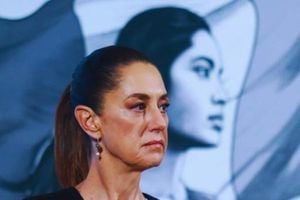Millie Bobby Brown's recent public appearance ignited discussions across social media about her perceived age, reflecting the complex relationship between celebrity culture, personal style, and societal expectations of beauty. The 21-year-old actress was spotted at the premiere of her latest film, 'Electric State', on February 24, 2025, where she donned an eye-catching golden dress adorned with beads.
Dressed to impress, Brown arrived at the star-studded event alongside her husband, Jake Bon Jovi, son of rock icon Jon Bon Jovi. The couple showcased their affection, stealing moments on the red carpet as they posed for cameras. While Jake wore a classic dark tuxedo, Millie's ensemble included not only the intricately embellished dress but also a captivating cape and dramatic makeup, completing her glamorous look.
Despite her fashion-forward choices, Millie's appearance sparked controversy online, with many fans expressing astonishment at how much older she seemed. Comments ranged from disbelief to concern, with one user stating, "I literally had to double check she just turned 21, not 40," highlighting the intense scrutiny faced by young celebrities.
Social media platforms lit up with remarks about her stylistic decisions, with some users quipping, "She looks like she’s 30 already," and others expressing, "It seems she needs a new stylist." This reaction was not merely isolated; it reflected broader conversations about the pressures young women face to adhere to certain beauty standards, often leading to unrealistic expectations.
Millie's recent change to blonde hair also contributed to the discussions surrounding her age. Many observers wondered if her new look—combined with her outfit choices—added years to her appearance. Some commenters even drew comparisons between Brown's look and other public figures, such as Ivanka Trump, prompting reflections on the complexity of identity and perception within the public eye.
Despite the negative commentary, there was also notable support from her fanbase. Many followers admired her look, appreciating her for embracing bold fashion choices. The duality of opinions serves as a reminder of the challenges those who grow up under the public spotlight endure.
Responding to her critics, Millie Brown took to her social media platform, stating, "Women age!! I regret nothing:)," reflecting her perspective on the criticism directed at her. This response not only culled support from fans but also initiated dialogues about the importance of accepting natural aging and resisting the pressures of societal expectations.
The premiere of 'Electric State', where Millie stars alongside Chris Pratt, marked more than just another premiere; it became a platform for important conversations around female representation and image. While some viewed her vintage-inspired looks as aging, others celebrated them as part of her style evolution.
With the film set to be released on Netflix on March 14, 2025, interest is already growing. The movie, directed by the Russo brothers, tells the story of Michelle, played by Brown, who embarks on a perilous adventure across America searching for her younger brother.
The dialogue surrounding Millie's appearance is likely to continue as her career progresses. Growing up in the spotlight, she has had to navigate both the adoration of fans and the scrutiny of critics. This balancing act between cultivating her personal brand, embracing her individuality, and managing public perception is not only challenging but, for many young stars like Millie, seemingly inevitable.
Reflecting on her rise to fame, one might wonder if the concerns voiced by fans stem from nostalgia—viewing Millie as the young girl who first captivated audiences with her performance in 'Stranger Things'. Now, as she transitions to more mature roles and styles, it poses the question: are fans ready for the actress to grow up, or are they stuck on their initial perceptions?
Millie Bobby Brown's narrative highlights the intersection between youth, aging, and public personas. Her experiences serve as representative of many young women facing similar pressures, emphasizing the need for society to evolve its perceptions of beauty and age. The conversation surrounding her style choices is more than just about fashion; it speaks to longstanding issues of how women are viewed and valued based on their appearances.



